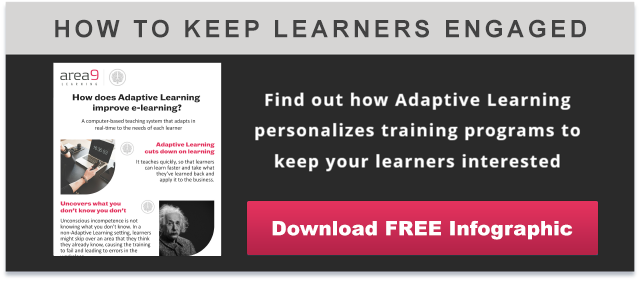If you want to make a change in learning and development, it won’t matter if you’ve convinced yourself Adaptive Learning is the key to an effective training program: you’ve still got to convince the stakeholders. And to do that you have to convince them that Adaptive Learning will positively affect your bottom line.
If you find yourself being asked by the CEO to improve employee productivity, and need extra evidence to sway opinions over to Adaptive Learning, here are some points that might help.
1. How to Improve Employee Productivity? Focus on Results
You might believe Adaptive Learning is an effective training approach and know it improves employee work habits. But when you’re meeting with the CEO, you need to show, in concrete ways, how Adaptive Learning will save the company money by reducing scrap learning and improving productivity. A good place to start would be this page, then read on to pick up some concrete numbers to give to your CEO, like:
- Adaptive Learning trains up to 50% faster
- Adaptive Learning uncovers and corrects unconscious incompetence, which exists between 15-40% in core competencies for every employee
2. Train Faster, Produce More
The company has hired employees for one obvious reason: to work. But employees can’t do that if they’re stuck in training. The average employee spent 47.6 hours in training in 2017, up four hours from 2016.
And not only that, but if the training is ineffective (some studies found that 80-85% of corporate learning is ineffective), employees will need to repeat it. Not only is Adaptive Learning faster than traditional corporate learning (up to 50%), and more accessible (online and mobile), it’s also more successful at improving the amount of knowledge retained through training.
Since learning is not a one-time event, repeated exposure to each learner’s most difficult learning item is necessary to ensure true understanding. Tell your CEO that Adaptive Learning helps employees learn faster while guaranteeing mastery.
3. Show Off Adaptive Learning’s 3-Level Reporting Abilities
The detailed level of reporting done by Adaptive Learning ensures that employees, who might be tasked with collecting the data needed for reporting, can devote time to other tasks. Reporting is available at three levels:
- Learner - individual employees can self-evaluate their performance.
- Team - managers receive an analysis of team-wide performance so they can compare team-member performance or assess overall team capability.
- Company - company-wide reporting indicates the business’s overall ability to execute strategy.
Adaptive Learning’s detailed analytics removes the necessity for human work in compiling training data. You get excellent data on your training and e-learning effectiveness, without the time cost.
Tell your CEO that you can use the granular data you collect from the learning management system to:
- Prove proficiency: Adaptive Learning guarantees proficiency because it provides training that focuses on mastery of learning content, instead of simply completion of the training course
- Effect metacognition: Adaptive Learning uncovers instances of unconscious incompetence, or learners not knowing what they don’t know, corrects it, and builds learner confidence so that mastery can be reached faster
- Content effectiveness: the data collected from Adaptive Learning courses show you which training is working the best and how and where to improve training impact
Adaptive Learning Is Proven to Be a More Effective Training Program
For more evidence to convince your CEO, check out the Area9 case studies page. If you need data that’s specific to your company, contact Joe Barrow, senior vice-president of business development at Area9. Combine this knowledge with the three points above and your pitch will stand a great chance!









